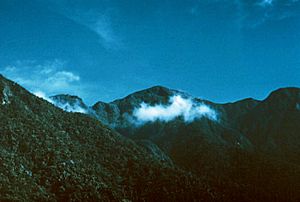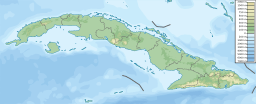Sierra Maestra facts for kids
Quick facts for kids Sierra Maestra |
|
|---|---|

Sierra Maestra near the border of Granma and Santiago de Cuba provinces.
|
|
| Highest point | |
| Peak | Pico Turquino |
| Elevation | 1,974 m (6,476 ft) |
| Dimensions | |
| Length | 240 km (150 mi) |
| Width | 30 km (19 mi) |
| Geography | |
| Country | Cuba |
| Range coordinates | 20°0′0″N 76°45′0″W / 20.00000°N 76.75000°W |

The Sierra Maestra is a large mountain range in southeastern Cuba. It stretches across the southern part of what was once the old Oriente Province. These mountains rise steeply from the coast. Most of the range is located in the Santiago de Cuba and Granma Provinces.
The highest point in the Sierra Maestra is Pico Turquino. It stands at 1,974 meters (6,476 feet) tall. This makes it the tallest mountain in all of Cuba. The area is also rich in important minerals. These include copper, manganese, chromium, and iron.
Contents
What is the History of the Sierra Maestra?
The Sierra Maestra mountains have a long and important history. They have often been a place for people fighting for freedom.
Early Resistance and Wars
The first known resistance began with the Taínos. They were the native people of Cuba. Their leader, Guamá, fought against the Spanish in the early 1500s. Later, runaway enslaved people, called Cimarróns, also used the mountains as a safe place.
The mountains were also important during Cuba's wars for independence. These included the Ten Years' War (1868–1878) and the Cuban War of Independence (1895–1898). Many smaller conflicts also took place here. For example, the Race War of 1912 and uprisings led by Antonio Guiteras against leaders like Gerardo Machado and Fulgencio Batista.
The Cuban Revolution
The Sierra Maestra became famous during the Cuban Revolution. In 1956, Fidel Castro returned to Cuba. He had been living in Mexico. He and a few other survivors from a failed attack in 1953 found shelter in these mountains.
From their hidden bases in the Sierra Maestra, they grew their movement. This group was called the 26th of July Movement. They started a revolution across the region. They formed groups of guerrilla fighters. These fighters worked with other groups in the central provinces. They also worked with people in the cities. Together, they finally overthrew the government of Fulgencio Batista on January 1, 1959.
What Animals Live in the Sierra Maestra?
The Sierra Maestra is home to many interesting animals. It is especially important for birds.
Bird Life and Conservation
In 1998, people reported hearing calls of the Cuban ivory-billed woodpecker. This bird is now possibly extinct. The mountains are considered the most likely place to still find this rare bird.
The Sierra Maestra also hosts a population of Bicknell's thrush. These birds travel long distances. They spend their winters in these mountains. Protecting this habitat helps these birds survive.
See also
 In Spanish: Sierra Maestra para niños
In Spanish: Sierra Maestra para niños
- Geography of Cuba
- Turquino National Park
 | Dorothy Vaughan |
 | Charles Henry Turner |
 | Hildrus Poindexter |
 | Henry Cecil McBay |


